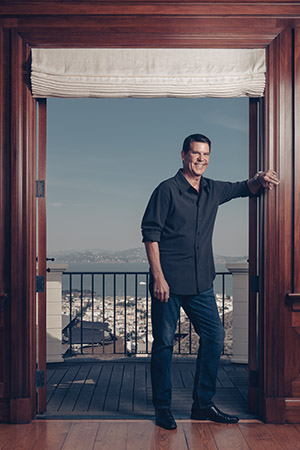Innovative Boilermakers whose work impacts the daily lives of millions
Keith Krach on Secrets to Success

How his father’s advice influenced his career
From his fourth-floor home office perched on so-called Billionaires Row, Keith Krach (IE’79) can see the entirety of the San Francisco Bay and the famous Golden Gate Bridge that spans the strait connecting the bay to the Pacific Ocean. It’s an impressive vista and a far cry from his hometown of Rocky River, Ohio, a Cleveland suburb.
The biggest dream Krach’s father had for him was that he would graduate from college with a degree in engineering. The elder Krach’s hope was that his son would return to Rocky River and eventually take over his modest steel fabrication shop. It was there, working alongside his father, that Krach began to learn the value of an industrious work ethic at a young age.
Krach’s father was 40 when he opened the machine shop after losing his job. When times were good, he employed five people. When times were lean, it was just the two of them. Krach started there in sixth grade doing scut work. By the time he was 15, he could run all of the machines.
“I learned so much from my dad,” says Krach. “I’ll never forget we were driving to the factory one day, and I asked him, ‘Dad, everybody likes you; why is that?’ And he says to me, ‘When you’re with the pope, you pray. When you’re with a drunkard, you drink. Anything in between goes, but always be yourself.’”
It was a lesson in what Krach calls “range with integrity.” It’s okay to adapt to situations to put others at ease; just don’t compromise your own values.
Krach’s trademark charisma also stems from his father. “My dad was so much fun to be around. He’s the funniest guy I’ve ever known,” he says. “I think that is the superpower of leadership.”
“My dad was so much fun to be around. I think that’s the superpower of leadership.”
Another thing he learned from his father: people support what they help create. Krach’s track record in business is evidence of his ability to serve as a catalyst to rally others. At age 26, he was named the youngest-ever vice president at General Motors. He capitalized on his experience there in the industrial robotics division to transition to tech, where he was a founding member of Rasna Corporation, a mechanical engineering software startup. Krach still remembers calling home in 1995 to tell his parents — dad on the kitchen phone and mom listening in on the bedroom line — the company had sold for half a billion dollars.
“I guess this means you’re coming home to Rocky River!” exclaimed his mother. But his father knew better. He heard the enthusiasm in his son’s voice and recognized his passion for both the business world and the tech industry. “I don’t think he’s ever coming back,” Krach recalls his father saying. He was right. His son would stay in California and go on to achieve levels of success he couldn’t fathom, nor would he live to see.
In 1996, Krach formed Ariba, a startup that revolutionized business-to-business electronic commerce. It was acquired by SAP for $4.3 billion in 2012 and today, $1 trillion of electronic commerce goes through Ariba — more than Amazon, eBay, and Alibaba combined, by the way. The doodle hanging above his office fireplace depicts the plan for Ariba’s system architecture, which he sketched in crayon on a restaurant tabletop with the other six founders.
He replicated success once again as chairman and CEO of DocuSign, another industry disrupter valued at $3 billion. The e-signature software is changing the way people do business so much so that DocuSign has become a verb, just as Google did before it. After passing the reins to his successor in the beginning of 2017, Krach remains active in the company as board chair.
“It’s one thing to create a new product,” Krach says. “It’s a whole other thing to create an entire new industry or market. It’s really that simple. What I learned from my dad was just plain old horse sense. People buy from people they trust and they like. In business, you don’t have a lot of time. So the key is to have deep, meaningful, relationships built on trust. And they accumulate over time.
“If you made a family tree of Silicon Valley, you’d clearly see how everyone is connected. Ariba spawned 10 company CEOs. You’re known by your legacy and the people you’ve worked with,” Krach says. “It’s the land of give back and pay forward. That’s it. That’s the secret sauce.”
An insider’s take on venture capital from one of the hottest investors in the Valley

Born in Pakistan and raised in Frankfurt, Germany, Mamoon Hamid (ECE’97) spoke five languages by age 5 and graduated from college at age 19. His investment portfolio has generated buzz and earned him a spot on the Forbes Midas List of the 100 best venture capitalists in the world four times. An early investor in Yelp — Hamid and Yelp cofounder Jeremy Stoppelman were classmates at Harvard Business School — he also backed Yammer, which Microsoft acquired for $1.2 billion in 2012, and collaboration platform Slack, which has achieved unicorn status, a term for private companies valued at $1 billion or more.
Earlier this year, Hamid left Social Capital, a venture capital firm he cofounded in 2011, to join the storied venture capital firm of Kleiner Perkins, known for its role as first investor in tech giants Amazon and Google.
How do you explain venture capital to people who are unfamiliar with the process?
It’s the science and art of recognizing where technology is taking this world and then catalyzing the people that use technology to create the world that we want to live in. It’s not research. It’s not 10 years forward looking. It’s two to five years forward looking.
How do you decide whom to meet with?
For every 100 companies we spend time with, we’re investing in one company. That’s why you filter who you decide to meet with based on who’s saying you should meet with them. It becomes very much referral-based. I get a lot of cold emails, and I know how it feels to send cold emails to what are seemingly important people. You try to give even those people some time and some quick advice. You can’t meet in person, but you try to at least give them a quick two-liner, like, “Hey, this is what I think you should do.” It makes people feel heard: “Wow, this person didn’t have to do that.”
When someone lands a pitch meeting, what’s that process like?
It’s not like Shark Tank, where the investors judge quickly. Ours is a very organic process. It’s a lot of them sharing their ideas and me giving feedback as to how I think the market looks, how you would build a team, how you could raise capital. There’s a bunch of pre-investment meetings where you’re just talking. It’s an opportunity to explore the possibilities, to say, “I like where you’re going, but I would adjust.”
How much does your assessment of the person weigh in your decision to invest?
You’re looking for not only a technologist, but someone with strong leadership skills and an ability to execute, build product, and assemble a team around them. You’re looking for shared values and a mission that resonates with you. If you’re going to spend the next 10 years with this founder in three-hour board meetings, having dinner, and spending time together, you actually want to like that person.
What are the characteristics that make an entrepreneur stand out?
They have an authentic mission, and it’s typically informed by pain that they suffer themselves, and they dwell on that problem. I want pragmatism in the approach as to how they get to market, how they build a product. I do look for people who have mission and a vision but at the same time are practical enough to execute in the present.
What’s your role as an investor?
The kind of place that Kleiner Perkins is, we are the first investor, the first board member, the first adviser. We’re going to be with that CEO founder on the journey of a decade plus. In some cases, you could still be around the table 20 years from now. Others, you might leave the board once the company goes public.
What do you see as a future trend for the tech industry?
Our productivity as humans has gone up, but we’ve become burdened by technology in a way. How do we take off the cognitive load of technology in our day-to-day lives where the machine does basic things for you? Artificial intelligence and machine learning come by summarizing important things or taking care of the menial tasks in our lives, whether it’s professionally or personally. Where can we create more time at work, at home? In the last 10 years, telecommuting, video conferencing, all kinds of stuff has happened to improve efficiencies, but transportation’s going to be a big one in the future.
Guided by Faith, Inspired to Make an Impact
Nearly every pivotal moment in Darwin Ling’s (S’88, MS S’90) life can be linked to his faith. A pastor from his church had a son who attended Purdue and recommended it as a good science and engineering school. Ling had never even heard of the college before applying. When he arrived in Indianapolis after the arduous trip from Hong Kong, he was unprepared for the culture shock.

“Little did I know that West Lafayette was not what I anticipated,” Ling says. “There were cornfields along the highway. I had no understanding of a small Midwestern town. It took a lot of adjustment.”
“There were cornfields along the highway. I had no understanding of a small Midwestern town. It took a lot of adjustment.”
His freshman year was challenging. A difficult course load and late nights of programming were magnified by acute homesickness. The following year, Ling got involved with Upper Room Christian Fellowship, which provided him with a support system and a sense of belonging. Eventually he met the woman who would be his wife, Stephanie (Lai) Ling (S’92).
After graduating, he spent 12 years in startup hotbed Austin, Texas, where he gained valuable experience in the tech industry. When his mom took ill in 2003, Ling uprooted his family and moved to San Francisco — one of the most expensive cities in the country — to be near her with two young children in tow. He didn’t have a job lined up, but he had faith that things would work out all right. And they did.
He was a founding member of several startups that were later acquired and most recently led the early engineering effort for SmarterMe, which aims to improve sales productivity by bringing artificial intelligence and machine learning to the workflow. Amassing enterprise customers such as Danaher, Home Depot, and GE, the company was acquired in 2017. Despite his impressive record for success, Ling insists the entrepreneurial life isn’t rosy all the time.
“There are many, many failures,” says Ling. “It’s not about the idea. If you really want to make a difference, that is what drives people.”
As an angel investor, he had the prescience to fund successful initiatives in early stages, including SoFi, a student loan financier that was valued at
$100 million when Ling signed on and is currently worth $5 billion. It’s an instinct he hopes to translate into venture capitalism during the next phase of his career.
“I want to combine my technology background to contribute to society by improving the well-being of individuals,” says Ling. “I want to make an impact. At first it was hard to adjust to life in Indiana, but Purdue gave me my strong work ethic. God put me there. There is purpose in everywhere we go. Through all my ups and downs, my life has surpassed anything I could have imagined. I am very blessed.”
Grab Two Tequila Shots & a Quarter and Other Life Lessons from Google VP Jim Miller

It’s been a long, strange journey from Purdue to Google, but Jim Miller (AAE’86), vice president of worldwide operations for the multinational tech company, still remembers an early decision that propelled his career forward. Miller followed up his undergraduate degree with a master’s from MIT. He then landed a job as production manager at Intel during the introduction of the Pentium chip, which launched the modern era of the microprocessor. It was an exciting time in tech. When he had the opportunity to join a Bill Gates-owned startup, requiring a relocation from Phoenix to Seattle, he ruminated over the pros and cons of the move.
He and his wife escaped to Cancun for the weekend, and by Saturday night, they still hadn’t made a decision. So she grabbed two tequila shots and a quarter. It came up Seattle. That set Miller on a path that would include key roles working at some of the biggest names in tech, including Amazon, Cisco, and Google. Here, he shares some of the life lessons he’s gleaned along the way.
Everything you learned in school will soon be obsolete.
The last three jobs I’ve had didn’t exist when I left college. There was no World Wide Web. College teaches you how to learn and learn more. You’re going to have to do that your whole life.
It’s a small world out there.
The average new graduate is going to have a dozen job changes. If you’re going to leave a job, leave it on good terms. There are times when you’ll face ethical dilemmas, and that’s when you’ve got to step back and act with moral courage. You’re going to live with your reputation for the rest of your life.
Be the dumbest person in the room.
Leadership is all about getting people better than you and smarter than you to actually want to follow you somewhere. I learned this from the head of human resources at Cisco. You can’t be afraid of being the dumbest person in the room. If you really want to get good, you’d better work with really smart people that teach you a lot.
Make decisions.
When I first became a manager at Intel, I asked my CEO, Andy Grove, for some advice. He said, “The rate at which companies succeed or fail is the rate at which they make decisions.” He was absolutely right. I’ve seen this played out a bazillion times in Silicon Valley.
Have a personal board of advisers.
Having people close to you who can honestly say what they think of you, how you manage people, what your faults are — that’s something I think is critically important. It will help push you out of your comfort zone.
It’s always day one.
At Amazon, Jeff Bezos used to run around the office with his boisterous laugh, crowing, “Oh! It’s day one! Ha ha ha!” The reality is, it is day one all the time because you’re always re-creating and reinventing things.
The day you stop having fun at work is the day you should pack your boxes.
That’s my acid test. Silicon Valley is hyper-competitive. It’s hyper-creative. It’s also hyper-innovative, but that can take a great personal drain on you because you’re always on. I tell people I go to Google for volunteer work. I do things that I love to do, and I go to work because I have fun.
Major Moves that Built a Marketing Career
Growing up in small-town Indiana, Dee Anna McPherson (LA’91) dreamed of seeing the world. She intended to study journalism when an adviser pointed out that a newspaper career meant moving around from small town to small town. She switched to communications in hopes of landing a job in a larger city. Except she graduated on the tail end of the early ’90s recession when jobs were scarce.

“I decided I’d just pick up and move to Chicago,” McPherson says. “Through a waitressing job in the city, I met a woman who was vice president at an agency, and she gave me my first job.”
McPherson’s career trajectory is the stuff of American dreams. Her next major move was to New York City — “I think I had $2,500 to my name, which I borrowed!” — where she stayed for six years, working with tech clients at Edelman, a global public relations agency. The CEO sent her to Dallas to turn around an office that was bleeding money in the middle of the Telecom boom. If she succeeded, she could choose any office in the world for her next move. That’s how she ended up in Silicon Valley at the height of the internet bubble.
“Two months later, the bubble burst,” McPherson says. “Companies went from having so much money to spend on marketing and communications, and then it just came to an abrupt halt.”
Realizing the first budget that gets cut is the agency budget, McPherson made the shift to go in-house. She was the global head of public relations for PeopleSoft in 2003 when rival software company Oracle announced a hostile takeover.
“It was an amazing experience that I don’t wish on anyone else,” says McPherson of the bitter 18-month battle that ended with a $10.3 billion acquisition. After another six-year stint doing agency work again, she found her niche in executive leadership roles in startup companies.
“I had avoided working in startups for a long time because I had this perception that it was male-dominated and incredibly intense,” she says. “I began consulting with Yammer and fell in love with the company.”
She was tapped to head up communications but found herself wearing many hats. She incubated the customer success team and even had the sales engineers reporting to her for a time.
“That was a defining experience,” McPherson says. “It taught me that there’s something really powerful about a beginner’s mindset, about looking at a problem fresh and figuring it out.”
“There’s something really powerful about a beginner’s mindset, about looking at a problem fresh and figuring it out.”
After the enterprise social network was acquired by Microsoft in 2012 for $1.2 billion, she joined Hootsuite as vice president of marketing. Over the next three years, Hootsuite’s valuation grew to $1 billion. The entire time, McPherson was commuting to Vancouver, British Columbia. Initially it was about 25 percent of her time, but as her team grew to 100 people, she was spending closer to 70 percent of her time away from home.
“I just knew my son needed me to be home more,” McPherson says. “I made a hard decision to leave. I really loved Hootsuite, but I needed a breather after three years of commuting to Vancouver.”
She plans to use the leadership lessons learned from her startup experience in her next endeavor.
“I believe that great ideas can come from any corner of the organization,” McPherson says. “As long as you empower and share with your employees — they know what the goals are, they understand the customer pain points — they’ll be able to contribute on a much higher level.”
Chasing the Big Idea
No sleep for the scrappy startup
Four years post-graduation, self-described “data geek” Adam Weinstein (M’05) left his stable job at an Indianapolis-based email marketing company to launch his first startup. He may not have labeled it a startup at the time, but like many successful endeavors, it was an idea born from experience.

“I’d always been a sarcastic greeting card sender,” says the 34-year-old entrepreneur. “It’s sort of what I was known for in the family. But I was traveling a lot at the time, and I wasn’t keeping up on my snarky birthday cards. So I built something that would let me design a card online and have it printed and mailed for me. It would even look like my terrible handwriting, and no matter where I was, I could send a card out.”
Feedback from friends made him realize there was a market for one-off greeting cards, and he established online card maker enGreet, which he ran for a couple of years before his printing vendor bought him out. His idea lives on as thegreetingcardshop.com.
The short-lived experiment was enough to entice him to move to Silicon Valley on a whim in 2012. He and his wife had flown out for a half-hour meeting that stretched to three hours, almost missing their return flight. Two weeks later, they relocated to California so Weinstein could become the data guy at Bright, a job-matching site that was acquired by LinkedIn in February 2014 for $120 million.
He stayed on board at LinkedIn, leading a small analytics team. There he got his next big idea. While many other industries have collaboration platforms that enable sharing between team members, no such solution existed for analysts.
“You’re writing all of this code, but you’re not storing it anywhere,” says Weinstein. “LinkedIn literally generated a trillion pieces of data per day at the time. We had an army of folks making sense of it all but realized that 40 percent of the work we were doing had been done before … we just didn’t know by who.”
A bare-bones solution designed within their team had 300 users from across the company within 90 days, and in March 2017, Weinstein left LinkedIn to start Cursor, a data analytics platform designed for the modern enterprise. His cofounders joined him on August 21 with a projected timeline of having a functional product within the first six months. For now, the company is operating in what Weinstein describes as stealth mode — a scrappy staff, no sign on the door, and a simple landing page.
“There is something humble about Silicon Valley — failure is part of the process.”
“This is my one at-bat. If I screw it up, I’m not sure there will be another one, or it definitely won’t be as easy,” Weinstein says. “Thankfully, there is something humble about Silicon Valley — failure is part of the process. You have to be a hardworking person who just keeps going and has no rearview mirror. You can’t look back because there’s a lot of skeletons back there if you do.”
The Goods Life
Meet Julie Wainwright, the Savvy CEO who built a luxury consignment empire

Julie Wainwright (M’79) has always worked in a world where she had to make space for herself. In her first job as an assistant brand manager at Clorox, she quickly noticed that the only women in senior positions worked in human resources. Realizing that the corporate world offered limited opportunities for her at the time, she made the jump to the emerging tech industry.
“When I first started in tech, it was more of a meritocracy because everything was new,” she says. “I would be rewarded for doing real work because no one else could claim that what I did was theirs, which happens in larger companies. It was very satisfying.”
An early tech entrepreneur and e-commerce pioneer, Wainwright was CEO of online video rental store Reel.com, boosting sales from $1 million to $25 million over 18 months. She then became CEO of Pets.com, with its big budget marketing campaign featuring its iconic sock puppet mascot. A victim of the dot-com bust, the site shuttered within two years.
“Oddly enough, my failure at Pets probably freed me up to start my own company and take a bigger risk,” says Wainwright. “It was a big public failure. I’ve already been down that road, and it was really uncomfortable, but I came out of it.”
At the time, few may have predicted that Wainwright would rise to the level of success she now enjoys as CEO of The RealReal, including Wainwright herself. “I think the reason I waited so long to start my own business is because I didn’t have enough belief in myself that I could do it.”
“I think the reason I waited so long to start my own business is because I didn’t have enough belief in myself that I could do it.”
But do it, she did. The online luxury consignment marketplace she founded in 2011 will surpass half a billion dollars in sales this year. It was an idea sparked while shopping in a tony San Francisco boutique with a close friend who bought consignment items from the back of the store.
“When we walked out, I asked her ‘Why? I’ve never seen you step foot in a consignment store,’” Wainwright says. It wasn’t that her friend had any stigma about buying preowned; it was the hassle of sorting through piles of merchandise and dubious claims of authenticity that made consignment unappealing. Likewise, she wasn’t interested in the tedious process of sorting through her own closet, determining fair market value, taking photos, and posting them online. It was all too much trouble.
Wainwright judiciously researched the luxury goods market and studied the consignment model and discovered there was enormous potential in combining the two. Even with $10 million in sales in her first year — working out of her home and financed by friends and family — many male investors just didn’t get the idea. Initially, she didn’t have success raising capital until she reached a woman. That tune has changed. A seventh round of funding in June 2017 brought the company’s total to $173 million.
The RealReal makes the consignment process easy by sending a luxury manager to evaluate goods in the consignor’s home and handling every aspect of the transaction process, from photography to listing to shipping to paying the consignor in a timely fashion. Shoppers know they’re buying the real deal thanks to trained authenticators who inspect every item to weed out fakes.
Though the company boasts five million users, has grown to more than 1,000 employees — 70 percent of whom are women — and has expanded far beyond fashion into art, furnishings, jewelry, and watches, it still maintains a startup culture. The website reads, “We’re a team of scrappy, innovative thinkers who are passionate about the luxury lifecycle and get s*** done.”
“For me, treating the company like a startup means you’re hungry. You don’t take anything for granted,” Wainwright says. “You stay focused on creating something that no one’s ever done before in ways that are transparent and fair and fun. If you’re not growing, you’re dying. And if you don’t have a startup mentality, you won’t grow.”

